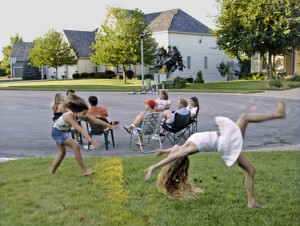If you Google “suburbia” you will get, in this order, a film and a play by Eric Bogosian, a song by Pet Shop Boys, and another film, this one a 1983 Roger Corman production about suburban runaway teens. Further down are two dictionary definitions: “suburbanites considered as a group,” with which I have no problem, and “suburbanites considered as a cultural class,” with which I do. Culture is one of those misused words like community that have lost their meaning. The idea of suburban culture, in particular, is plain silly. Americans (and many other nations) live in suburban areas, but that does not constitute a culture. Some suburbs look like low-density cities, and most American cities have neighborhoods that, to all intents and purposes are “suburban,” that is, they are composed of single-family houses on large lots. Years ago, Herbert J. Gans wrote The Levittowners, which argued, based on his first-hand observations, that when people moved to the suburbs (in this case to Levittown in New Jersey, mainly from Philadelphia) neither their politics nor their social values substantially changed. Living in a suburb no more constitutes a culture that liking hip-hop music or belonging to Facebook.


One of the interesting things about suburbs (and cities for that matter) is how they are stereotyped in popular media. Suburban “culture” has been defined as much by Leave it to Beaver and Ozzie and Harriet (and their successors) much more than by the people who actually live there.
But, while acknowledging that it is a gross generalization, I would argue that people choose to live in suburbia because of values that differ from those of people who choose to live in cities. Middle-class suburbanites are child-focused. They value education and safety. Middle class urbanites value diversity and intellectual engagement. These are what I would call cultural differences. A big night out for a suburbanite is pizza and the high school band concert, even if 15 years before it would have been the latest Cambodian restaurant and an art house movie..
Gans’ book was groundbreaking when it came out, but it represents a time when suburbia as we know it was just being formed. I’d love to see a comprehensive update.
Perhaps I’m splitting semantic hairs, but I don’t consider a lifestyle choice to constitute a culture. Of course, I’m also skeptical of concepts such as the “intelligence community,” so perhaps I’m just more conservative than you are.
I strongly believe there are suburban cultures. Not just one, but several, depending on where you live. As Guy notes, what you consider an evening of entertainment constitutes a cultural attribute, as does your priorities for raising your children (what kind of school they go to, how they spend their after-school hours, whether they are surrounded by diversity or grass). Culture is not solely defined by who you vote for or whether you support, for instance, gun control.
And regarding the supporting analogies: there is *very* much a hip-hop culture. A certain style of clothes, of speech, of living. And no denying there is a facebook culture as well. Take someone who uses it often and pit him or her against one who eschews it and you’ll find many differences. If they are not cultural, what are they?